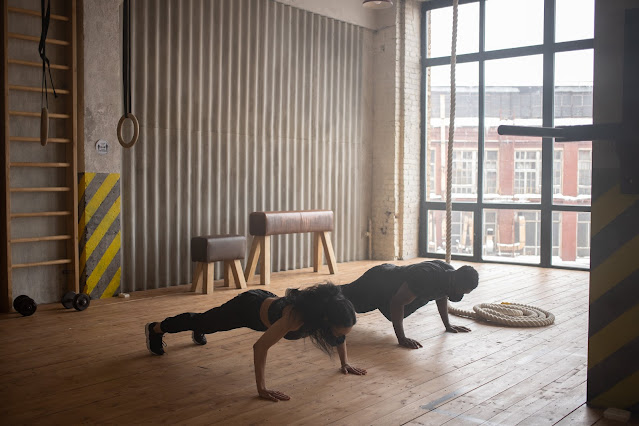Fitness, Exercise and Health Benefits, How to Get Started l Daily Health Idea
A higher level of overall fitness is associated with a lower risk of chronic disease as well as a better ability to manage emerging health problems. Better fitness also promotes greater functionality and mobility throughout one's life.
And in the short term, being active can help with your daily functioning, from better mood to sharper focus to better sleep.
Simply put: our bodies are meant to move, and
they work better when we're fitter.
 |
| Fitness, Exercise and Health Benefits, How to Get Started l Daily Health Idea |
That stated, it's also vital to understand that there are numerous approaches to get suit (consider a ballet dancer vs. A bodybuilder or a sprinter vs. A gymnast). And there is no single "look" to fitness. In
fact, appearance doesn't necessarily tell you much about someone's habits,
whether they're really physically active, or even if they're fit at all.
What It Means to Be Fit?
According to the Physical Activity Guidelines for Americans advanced through the USA Department of Health and Human Services (HHS), there are 5 additives of bodily health:
Cardiorespiratory Fitness is your VO2 max.
It's your body's ability to take in and use oxygen (which feeds all your
tissues), which is directly related to your health, says Abby Smith-Ryan,
professor and director of the Applied Physiology Laboratory at the university.
Health and quality of life. of North Carolina in Chapel Hill.
Musculoskeletal Fitness This consists of muscular strength, patience, and power.
Flexibility is crucial as it limits the variety of motion of your joints.
Balance is your capability to live in your ft and live consistent to avoid falling.
Speed is how rapid you can move.
Types of Fitness
There are a few key components of fitness,
all of which are important to creating a good exercise routine. Below, you'll
find items included in the Physical Activity Guidelines for Americans, which
HHS highlights as components that should be included in weekly exercise. (It's
worth noting that many definitions of fitness include other components, such as
endurance, muscular endurance, strength, speed, balance, and agility—as noted
above.)
Aerobic (Cardiovascular) Exercise
Aerobic exercising is the muse of all fitness packages - and for true reason. Also known as cardiovascular workout or aerobic, this form of bodily activity increases your coronary heart charge and respiratory fee, which improves your cardiovascular fitness, consistent with the American Heart Association.
Aerobic exercise includes such activities.
Strength Training
Strength schooling is an important manner to enhance your mobility and overall feature, particularly as you get older. As someone a while, these muscle tissues begin to decrease, that could drastically affect your high-quality of life. "Strength exercises build bone and muscle, and extra muscle protects your frame from the wear and tear which can occur as you age," says Robert Salles, MD, family medication at Kaiser Permanente, Fontana, Calif. Dr. K and chairman of the exercise says.
According to the ACSM, physical activity
guidelines include brisk walking, running, bicycling, swimming, aerobic fitness
classes (such as kickboxing), tennis, dancing, yard work, tennis, and jumping
rope.
 |
| Fitness, Exercise and Health Benefits, How to Get Started l Daily Health Idea |
Flexibility and Mobility
According to the International Sports Sciences Association, flexibility and mobility are both important components of healthy movement. However, they're not synonymous.
Flexibility refers to the capability of tendons, muscle tissues, and ligaments to stretch, at the same time as mobility refers to the body's ability to transport a joint thru a complete range of motion.
According to Physical Activity, there are no particular pointers for the wide variety of minutes you ought to do sports that enhance flexibility or mobility (such as stretching), and the fitness blessings of those sports aren't properly-researched. The cause isn't known.
Health Benefits of Exercise
Improved fitness significantly reduces the chance of persistent diseases that expand over the years, such as heart ailment, type 2 diabetes, and even cancer. "The one aspect a good way to assist prevent almost any disease is health," says Grayson Wickham, DPT, CSCS, founding father of Movement Vault, a mobility and mobility corporation in New York City.
In 2007, ACSM partnered with the American
Medical Association to launch the Exercise Is Medicine initiative, which aims
to make physical activity assessment part of routine medical care and provide
exercise resources to all able-bodied people. The benefits of physical activity
remain scientifically proven, and they can be as powerful as any pharmaceutical
agent in the prevention and treatment of various chronic diseases and medical
conditions,” notes the initiative's website.
Here is a breakdown of these benefits:
Exercise Boosts Your Mood.
According to analyze, normal exercise has been shown to be a buffer in opposition to depression and anxiety. What's greater, other studies display that exercising can help manage and deal with symptoms of despair, notes a scientific article. Exercise can assist lessen irritation, some thing that has been proven to be extended in humans with despair. It's additionally feasible that bodily interest promotes favorable changes inside the brain, the researchers say.
Exercise Is Good for Sleep.
A day by day workout recurring assist you to sleep more soundly at night time. Of the 34 research covered within the systematic overview, 29 observed that exercising advanced sleep first-class and became associated with longer sleep.
It can help set your body clock (so you're awake and asleep at the right
time), induce chemical changes in the brain that favor sleep, and, as past research
suggests, sleep. can reduce pre-anxiety that might otherwise hold you back.








Post a Comment